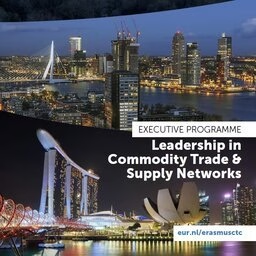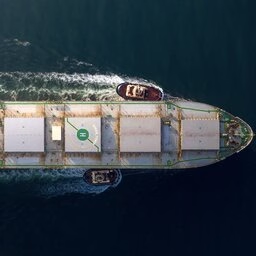Senior Researcher

- Email address
- w.a.a.jacobs@ese.eur.nl
- Phone
- +31(0)10 408 1851
- Room
- Mandeville, Room T19-35
Biography
Wouter Jacobs (PhD, 2007) is the founder and executive director of the Erasmus Commodity & Trade Centre (ECTC), fostering talent and ideas for future trade. He secured partnerships with 12 international firms through the Erasmus Trustfund. ECTC engages in academic and professional education, executive development, and applied research. Wouter leads the Leadership in Commodity Trade & Supply Networks executive program, launched in 2019, partnering with Singapore Management University and the J.P. Morgan Center for Commodities. At Erasmus University, he is a senior research fellow at Erasmus UPT and has coordinated MSc programs in Urban Port & Transport Economics and Maritime Economics & Logistics for over a decade. In 2019, he won a 5-year tender to develop the Maritime Studies Programme Abroad for Nanyang Technological University. Since 2018, he has coordinated the MSc elective Introduction to Commodity Trade & Supply Networks at Rotterdam School of Management. Wouter serves on the advisory board of the J.P. Morgan Center for Commodities, has published in international peer-reviewed journals, and is frequently cited in major media like Financial Times and Bloomberg. His contract research involves key stakeholders such as the Municipality of Rotterdam, Port Authorities, and the Dutch Ministry of Economic Affairs. Expertise
|
Main Research Areas
|
 Executive Programme Leadership in Commodity Trade & Supply Networks
Executive Programme Leadership in Commodity Trade & Supply NetworksLeadership in Commodity Trade and Supply Networks is a unique international executive programme. It is the only programme that will take you to three continents, and is designed for the business and with the business. It is interdisciplinary in scope, and focuses on interactive and reflexive learning in developing leadership skills and strategic thinking. Erasmus University Rotterdam produces the programme in partnership with the International Trading Institute of the Singapore Management University and the J.P. Morgan Center for Commodities at the University of Colorado Denver Business School.
Duration: 3.5 weeks
Client: Participants are professionals from the commodity trading industry with approximately 10 years of experience moving up in the organization. They come from different backgrounds: trading, risk, operations, finance.
 RSM Elective Introduction to Commodity Trade and Supply Networks
RSM Elective Introduction to Commodity Trade and Supply NetworksThe aim of the course is to introduce students to the world of physical commodity trading, explaining the mechanics of commodities trade (trading, risk management, finance, shipping) and the dynamics that shape the future of the industry.
Duration: 10 weeks
Client: Rotterdam School of Management (RSM)
 Seminar on Scenario Planning
Seminar on Scenario PlanningScenario planning originates from the military. Scenarios have allowed military planners to augment enemy maneuvers and get a grip on the uncertainties of a dynamic battlefield in order to manage the deployment of troops and military assets effectively. Likewise, international businesses and multinational enterprises operate in various interconnected markets, and are exposed to a great variety of risk, non-linearity and complexity. Think about the sudden but enormous impact of Covid-19 on the short term (quarantines, travel bans) and the long term (digital acceleration, de-globalizing supply chains) on business strategy and operations.
Duration: 7 weeks
Client: Erasmus university, School of Economics
Further projects and publications
- Groenvermogen.nl, Workpackage 7, Task 2.1.1 Global Supply Chains, Postdoc research project. Role; main applicant, under review.
- Quickscan Port of Rotterdam in the Critical Raw Materials Value Chain. Research commissioned by the Port of Rotterdam Authority. Role: project leader, 2023
- Commodiphy. The commodification of ammonia and the role of Rotterdam as a global pricing centre, Research report funded by Resilient Delta Initiative. Role: project leader, 2023
- H2TB-Geopolitical and Societal Implications of Emerging Low-Carbon Hydrogen Trade & Supply Networks in the ARRRA Supercluster, ECTC, CIEP, TUDelft and Drift, report funded by Smartport, Resilient Delta and Province of Zuid Holland and Port of Rotterdam Authority. Role; project leader ECTC. 2022-2023.
- Evaluation report of ESG Scorecard, Research Commissioned by ING Bank TCF, Geneva, Switzerland. Role: Projectleader, 2023.
- Strategic advice on the role of platform economies, Research commissioned by Cefetra Group, Role: Project leader, 2023.
- Quickscan, Sustainanable Soy for Animal Feed Value Chains, report commissioned by Accez, 2023.
- Expanding Commodity Trade in Rotterdam, Research commissioned by the City of Rotterdam, November 2014-2015. Role: project leader.
- New urban port spaces. Exploring new business opportunities for Port of Amsterdam, Research commissioned by the Port of Amsterdam Authority, November 2016-May 2017, Role: project leader.
- Antwerp Maritime City. A feasibility study. Research commissioned by the Antwerp Chambers in Commerce, City of Antwerp and Flanders Investment & Trade, Augustus-2014-Jan 2015, Role: principal researcher
- Rotterdam and Global Commodity Trading, Research commissioned by the Municipality of Rotterdam, October 2013- May 2014. Role: project leader and principal researcher.
- Amsterdam Smart Port in Global Trade, Research commissioned by the Port of Amsterdam Authority, December 2011-July 2012. Role: project leader and principal researcher
- United We Stand- Research Consortium of Utrecht University, VU University Amsterdam and University of Amsterdam, The Economic Geography of Knowledge-intensive Business Services in the Northwing of the Randstad. Research commissioned by the Dutch Ministry of Economic Affairs, Agriculture and Innovation. December 2009-December 2011. Role: principal researcher Utrecht University
- Benchmarking Maritime Services Centres, Contribution to the OECD study on ‘Global Ports and Urban Development.’ Research commissioned by the Organisation of Economic Co-operation and Development (OECD), Public Governance and Territorial Development Directorate, Paris, April-May, 2011.
- Demand analysis of advanced maritime services in the port of Rotterdam and policy scan of international maritime centres. Research commissioned by the City Development Corporation of Rotterdam. In collaboration with Erasmus University Rotterdam (RHV Bv). January-May 2011. Role: subcontracted researcher.
- Contribution to Erasmus University Rotterdam (RHV bv)/ TNO Innovatie & Ruimte, Van Mainport naar Wereldstadhaven. Belang en betekenis van mainports in 2040 voor de Nederlandse economie, Research commissioned by the Dutch Ministry of Infrastructure & Environment, July-December 2009.
- The relationship between port and city: the role of advanced producer services. Research commissioned by City Development Corporation of Rotterdam and Port of Rotterdam Authority, May 2007- May 2009. Role: principal researcher
- Contribution to Berlage Institute: Seamangeum Archipelago of Innovation. Economic Analysis Report, prepared for the Korean national government, Spring 2008.
- Contribution to Koppies & Stevens Port Strategy Consultants: ‘Staying one of the Competitive Logistical Hubs in Northeast Asia. Lessons from Rotterdam and Dubai’. Presented at the Conference: "International Forum on National Ocean Strategy. Initiative Korea: Ocean Vision 2016", 14 September 2006 in Seoul, Korea.
- Contribution to European Spatial Policy Observatory Network (ESPON), ’Governance of Territorial and Urban Policies from EU to Local Level’, project no. 2.3.2., Interim Report on Data & Indicators of Good Governance. October 2004.
- Van den Berghe, K., Peris, A. and W. Jacobs (2023), The emergence of polycentric port regions. The case of ARA and the US Gulf Coast, In: Ducruet, C., and Notteboom T., (eds.), Port Systems in Global Competition: Spatial-Economic Perspectives on the Co-Development of Seaports, Routledge 2023, ISBN 9781032327730.
- Van den Berghe, K., Peris, A., Meijers, E. and W. Jacobs (2022), Friends with benefits: the emergence of the Amsterdam-Rotterdam-Antwerp (ARA) polycentric port region, Territory, Politics, Governance, vol 11 (23). pp 301-320.
- Boelens. L. and W. Jacobs (2021), The Randstad and its mainports: towards new heterogenous discourses in Dutch planning, In: Zonneveld, W. and V. Nadin (eds),The Randstad. A polycentric metropolis, Routledge.
- Jacobs, W. and R. Horster (2020), Commodity supply networks as complex adaptive system. How commodity and freight respond to a supply shock, In: Wilmsmeier, G. and J. Monios (eds.) Geographies of maritime transport, Edward Elgar
- Van den Berghe, K., Jacobs, W. and L. Boelens, (2018), The relational geometry of the port city interface. Case studies of Amsterdam, the Netherlands and Ghent, Belgium, Journal of Transport Geography, 70: 55-63.
- Jacobs, W. (2018), Commodity traders as agents of globalization, In: Hoyler, M, Watson, A. and C. Parnreiter (eds), Global City Makers, Edward Elgar.
- Raimbault, N., Jacobs, W. and F. van Dongen (2016), Port regionalization from a relational perspective. The rise of Venlo as Dutch international logistics hub, Tijdschrift voor de Sociale en Economische Geografie, 107(1):16-32
- Jacobs, W. and M. Huijs (2016), Havensteden als Handelsplaatsen, Tijdschrift Vervoerswetenschappen 51 (3): 62-82.
- Ng, A.K.Y, Ducruet, C., Jacobs, W., Monios, J., Notteboom, T.E., Rodrigue, J.P, Slack, B., Tam, K.Y. and G. Wilmsmeier (2014), Port geography as a sub-discipline of human geography. The changing tides and development, Journal of Transport Geography, Vol 41: 84-96.
- Jacobs, W. (2014), Rotterdam and Amsterdam as Trading Places?. In search of the economic-geographical nexus between commodity chains and world cities, Tijdschrift voor de Economische en Sociale Geografie, Vol 105: 4, pp. 483-491.
- Li, J.Y., Notteboom, T.E. and W. Jacobs (2014), China in Transition. Institutional change at work in inland waterway transport on Yangtze River, Journal of Transport Geography 40: 17-28
- Jacobs, W., Van Rietbergen T., Van Grunsven, L., Atzema, O. and F. Van Dongen (2014), The Impact of Multinational Enterprises (MNE) on Start-ups of Knowledge-Intensive Business Services
- (KIBS). Empirical Evidence from the Dutch Randstad, Regional Studies, Online First: http://dx.doi.org/10.1080/00343404.2014.932905.
- Jacobs, W. and A. Lagendijk (2014), Strategic Coupling as Capacity. How Seaports connect to Global Flows of Containerized Transport, Global Networks, 14 (1), pp 44-62.
- Jacobs, W., Koster, H.R. and F. van Oort (2013), Co-agglomeration of knowledge –intensive business services and multi-national enterprises, Journal of Economic Geography, Online First: 8 January: doi:10.1093/jeg/lbs055, pp.1-33.
- Notteboom, T.E., De Langen, P. and W. Jacobs (2013), Institutional Plasticity and Path Dependence in Seaports. Interactions between Institutions, Port Governance Reform and Port Authority Routines, Journal of Transport Geography, pp 26-35.
- Hein, C, Hall, P.V., Jacobs, W. and A. Wiese (2013), Conference Report: Port Cityscapes. Dynamic Perspectives on the Port-City-Waterfront Interface, Town Planning Review 84 (5), pp 805-810.
- Jacobs, W. and B. Kuipers (2012), The Regulation of the Global Transport Industry. An Institutional account, In: Van den Bergh, R. J and A. Pacces (eds.), Regulation and Economics. Vol.9: Encyclopedia on Law and Economics. 2nd Edition (781 pages), Cheltenham: Edward Elgar, pp.495-526.
- Hall, P.V. and W. Jacobs (2012), Why are maritime ports (still) urban and why should policymakers care?, Maritime Policy & Management 39: 2, p189-206.
- Jacobs, W., Pegler, L., Reis, M., and. H. Perreira (2012), Amazon shipping, commodity flows and urban economic development. The case of Belém and Manaus, In: Hall, P.V. and M. Hesse (eds), Cities, Regions and Flows (265 pages), London: Routledge, pp 129-148.
- Van Grunsven, L., Jacobs, W., Atzema, O. and T. Van Rietbergen (2012), Strategic coupling between multinational subsidiaries and KIBS as mode of regional industrial transition, In: Fromhold-Eisebith, M. and M, Fuchs (eds), Industrial Transition. New Patterns of Production, Work, and Innovativeness in Global-Local Spaces (245 pages), Farnham: Ashgate, pp.117-134
- Van Tuijl, E., Carvalho, L. Van Winden, W. and W. Jacobs (2012), Multi-national knowledge strategies, policy and the upgrading process of regions: Revisiting the automotive industry in Ostrava and Shanghai, European Planning Studies 20 (10), p. 1627-1647
- Jacobs, W. and T.E. Notteboom (2011), An evolutionary perspective on regional port systems: the role of windows of opportunity in shaping seaport competition, Environment & Planning A, 43 (7): 1674-1692.
- Jacobs, W., Koster, H. and P.V. Hall (2011), The location and global network structure of maritime advanced producer services, Urban Studies, 48: 2449-2669.
- Hall, P.V., Jacobs, W. and H. Koster (2011), Port, Corridor, Gateway and Chain. Exploring the geography of advanced maritime producer services, In: Hall, P.V., McCalla, R., Comtois, C. and B. Slack (eds), Integrating Seaports and Trade Corridors, p. 81-100, Farnham- Burlington: Ashgate.
- Jacobs, W., Ducruet, C. and P.W. De Langen (2010), Integrating world cities into production networks. The case of port-cities, Global Networks 10 (1): 92-113.
- Hall, P.V. and W. Jacobs (2010), Shifting Proximities: the maritime ports sector in era of global supply chains, Regional Studies, 44 (9): 1103-1115.
- Jacobs, W. (2009), World Port City Networks. Exploring the geography of advanced producer services in the global shipping industry, Rotterdam: Erasmus University.
- Hall, P.V. and W. Jacobs (2009), Ports in Proximity, Proximity in Ports, Towards an Typology, In: Notteboom, T.E., Ducruet, C. De Langen, P. (eds), Ports in Proximity: Competition and Coordination among Adjacent Seaports, p. 29-40, Alderschot: Ashgate
- Jacobs, W. & P.V. Hall (2007), What conditions the supply chain strategies of ports? The case of Dubai, GeoJournal, 68, p. 327-342.
- Jacobs, W. (2007), Political Economy of Port Competition. Institutional Analyses of Rotterdam, Southern California and Dubai, Phd-Thesis, Nijmegen: Academic Press Europe.
- Jacobs, W. (2007), Port Competition between Los Angeles and Long Beach. An Institutional Analysis, Tijdschrift voor de Economische en Sociale Geografie, 98, p. 360-372.
- Buitelaar, E. , Lagendijk, A. & W. Jacobs (2007), A Theory of Institutional Change; Illustrated by Dutch land policy and Dutch City-regions, Environment & Planning A, 39, p. 891-908.
- Other professional publications:
- Jacobs, W. (2021), ‘Going where no one else would go’ in the digital age, In: Kingsman, J. (ed.), Commodity crops & the Merchants who trade them. Independently published, pp. 237-247.
- Jacobs, W. (2019), Zeldzame aardmetalen. Strategische grondstof of niet? Lichtkogel Trendossier 2, Rijkswaterstaat.
- Jacobs, W., Vries I, and M. Huijs (2015), Rotterdam. World port city, Port Technology International 65, February 2015.
- Jacobs, W. and T. van Bergen (2014), Understanding the economic geography of commodity trade, Port Technology International 61, February 2014.
- Jacobs, W. and L. Pegler (2012), Manaus. Metropolis van het Regenwoud [Manaus. Metropolis of the Rainforest], Geografie 6: 29-31.
- Pol, P.M.J., Jacobs, W. and R. Veerkamp (2011), Rotterdam Central District, In: Terin, J-J. (ed.), Gares et Dynamiques Urbanes. Les Enjeux de la Grande Vitesse, p. 106-121, Parantheses: GIP/Aigpua.
- Van den Berg, L., Nijdam, M., Jacobs, W. and E. van Tuijl (2010), Sustainable development of cities. What can leader firms do? Rotterdam: Euricur/ Erasmus University
- Jacobs, W. (2008), Rotterdam: World Port City!, In: Ontwikkelingsbedrijf Rotterdam, Economische Verkenning Rotterdam 2008. Kwaliteit van Werken. Kwaliteit van de Economie, Rotterdam p. 118-119.
- Jacobs, W. & H. Stevens (2008), De havens van Rotterdam en Amsterdam in groter verband [the ports of Rotterdam and Amsterdam in global context], In: Heijveld, W. and R. Daalder (eds). Havens van Amsterdam en Rotterdam sinds 1870, Jaarboek van Maritiem Museum Rotterdam en Nederlands Scheepvaart Museum, Walburg Pers: Amsterdam.
- Jacobs, W. & P.M.J. Pol (2008), Rotterdam Central District, Stedebouw & Ruimtelijke Ordening (S&RO), Den Haag: NIROV
- Jacobs, W. (2007), Havens als Handelswaar? [Ports as traded goods?], Economieopinie.nl, December 2007,
- Jacobs, W. (2006), Chinese Zeehavens. Draaischijven in de wereldeconomie, [Chinese seaports, hubs of the global economy] Geografie, 9, p. 10-14.
- Jacobs, W. (2006), Anti-terreur maatregelen in de internationale zeevaartsector [Anti-terrorist measures in the global maritime shipping industry], JASON-Magazine voor Internationale Betrekkingen, 2, p. 7-9.
- Jacobs, W. (2005), Booming Dubai. De olie voorbij [Booming Dubai, beyond the oil], Geografie, 8, p. 22-25.
- Jacobs, W. (2004), Property rights, markets and land use planning. The case of developing countries, Urbanistica PVS, 36/37, p.41-44.
